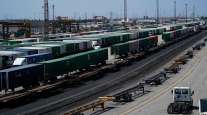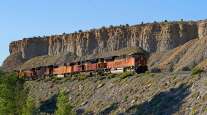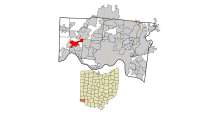Senior Reporter
Concerns Mount Over CN, KCS Rail Merger as Timetable Set for Regulatory Review

[Stay on top of transportation news: Get TTNews in your inbox.]
The Surface Transportation Board is taking public comments until June 28 on the proposed multibillion dollar merger of Class I freight rail companies Canadian National and Kansas City Southern.
The STB also said the railroads will have until July 6 to respond to those public comments.
As part of the review process, Canadian National and Kansas City Southern are asking the STB to approve what’s called a plain vanilla trust.
CN officials said the trust will allow KCS to maintain its independence during the STB’s review, prevent CN from taking premature control of the railroad and protects KCS’ financial health during the process — which experts say is expected to take a least a year to oversee.

Meanwhile, one month after expressing its concerns over the $33.7 billion rail deal, the American Chemistry Council has sent a letter to STB Chairman Martin Oberman indicating its displeasure with the overall state of the freight rail industry.
On May 25, five people pleaded guilty to staging two accidents in New Orleans with tractor-trailers in 2017, while obtaining fraudulent financial settlements totaling more than $282,000. Is the situation surrounding fraudulent settlements getting worse or better in 2021? Host Michael Freeze talks with TT's Eric Miller and Eleanor Lamb. Hear a snippet above, and get the full program by going to RoadSigns.TTNews.com.
“Current rail service challenges are harming ACC member companies, disrupting supply chains, restricting manufacturing, increasing costs and preventing companies from meeting customer expectations,” Chris Jahn, ACC CEO, wrote on June 8. “While recognizing that the COVID-19 pandemic created daunting challenges for railroads, particularly with crew availability, we believe the current issues reveal systematic capacity constraints caused by cost-cutting and major operational changes over the past several years.”
All of the major railroads have adopted what’s known in the industry as precision scheduled railroading, which is designed to increase efficiency by running longer trains with fewer employees. In their quarterly earnings reports, the railroads have announced significant reductions in year-over-year employee head counts.
According to an ACC survey of its members, the service issues in the freight-rail industry show some chemical customers are moving products to the trucking industry.
“There have been numerous situations where our customers (or our own terminals) were stocked out and close to shutting down forcing us to scramble trucks to resupply material or source material from alternate locations. We’ve missed sales orders and our customers have been forced to curtail production rates to avoid shutting down completely,” one chemical customer wrote in the ACC survey.
The letter said CSX and KCS were at the top of the list in terms of service complaints, but that all of the railroads are having difficulties meeting service demands.
The chemical industry said in its letter that in 2020, railroads moved 2.3 million carloads of chemicals and plastics and that number is expected to grow by nearly 10% by 2030.
ACC Letter to STB Regarding Rail Service by Transport Topics on Scribd
As the leaders of both CN and KCS continue their push to get the deal done, there are clear indications top officials of both carriers see KCS’ Mexican track and the trucking industry’s northbound and southbound freight corridor along the 1,569 miles of Interstate 35 that runs from the U.S.-Mexico border at Laredo, Texas to Duluth, Minn., as one of the key areas of future competition.
“What’s really missing in North America at this point is a true north-south railroad, that can really rival with truck,” said CN’s CEO JJ Ruest in a call with analysts. “It’s not very often that a Class I becomes available. There’s a bright future for a continental railroad that runs north-south.”
According to Ruest’s presentation, there is at least $8 billion available in post-merger business if CN and KCS combine and $6 billion of that could be siphoned from the trucking industry, especially as the now year-old trade agreement with the United States, Mexico and Canada begins to take hold while the post-pandemic economies of the three nations improve and businesses see opportunities to grow North American-exclusive trade.

Ruest
Peter Swan, logistics professor at Pennsylvania State University-Harrisburg, told Transport Topics the real value of KCS to CN is its Mexican and cross-border operations, especially with the new trade agreement in operation.
“I see it mainly as strategic. KCS has the best franchise in Mexico and has most of the traffic there. It’s a prize in that sense,” Swan said. “With coal dwindling away, the railroads are having to find a way to make intermodal more profitable and find some more money out of it. And a lot of the intermodal is going to be stuff from Mexican factories. I think it’s going to be auto parts, going back and forth and other things that are manufactured in Mexico and exported back in the U.S.”
Want more news? Listen to today's daily briefing below or go here for more info:




